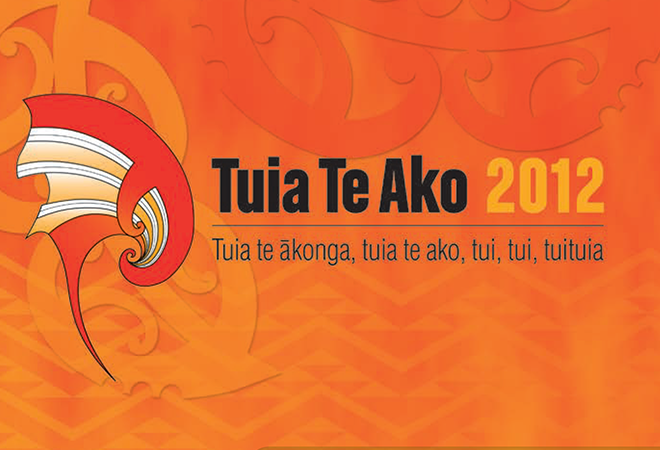
Tuia Te Ako 2012
Tuia Te Ako Conference 2012
A selection of video presentations from Tuia Te Ako 2012, Ako's second national Māori education hui.
Held at Pipitea Marae in Wellington across two days in March, Tuia Te Ako featured a range of speakers from across the wider tertiary education sector.
Key Points to Note:
Tuia Te Ako 2012 was Ako's second national conference focused specifically on enhancing Māori tertiary teaching and learning.
The two-day hui was an opportunity for Māori in tertiary education as well as hapū, iwi and Māori community representatives from throughout the country to come together to share in discussion and debate on a range of issues that impact on the success of Māori learners.
Ngā Pou | Themes
The overarching kaupapa of Tuia Te Ako 2012 was "Toi te ākonga, toi te whenua, toi te mana | Emphasise the learner, provide the resources, build self esteem".
The hui had four key pou or themes derived from the Ako Aotearoa Kaupapa Māori framework, Te Tauākī Ako:
- Kaitiakitanga – guardianship
- Manaakitanga – care and support
- Whakamana – empowerment
- Te Reo Māori – Māori language.
Ruakere Hond's presentation at Tuia Te Ako 2012: 'Tahia te marae Tahia te wananga’.
- 30 March 2012
Maria Maria Paenga's presentation at Tuia Te Ako 2012: ‘Mäori Into Tertiary Education – helping bridge the disparity gap for Mäori in education’.
- 29 March 2012
Professor Michael Walker's keynote presentation at Tuia Te Ako 2012: ‘Te Whenua, Te Tangata, Te Aronui, Te Märamatanga’.
- 29 March 2012
Mauriora Kingi's presentation at Tuia Te Ako 2012.
- 29 March 2012
Glenis Philip-Barbara’s presentation at Tuia Te Ako 2012: ‘Ko te reo tonu te mauri o te mana Mäori: Enabling powerful tertiary engagement with the language journey’.
- 30 March 2012
Jacqualene Poutū’s presentation at Tuia Te Ako 2012: ‘Äkonga Mäori’.
- 29 March 2012
Dr Elana Taipapaki Curtis’s presentation at Tuia Te Ako 2012: ‘Tātou Tātou: Success for all – improving Māori student success in health professional degree-level programmes’.
- 29 March 2012
Dr Te Huirangi E Waikerepuru’s presentation at Tuia Te Ako 2012: ‘He Wairua: He Mätauranga Mäori’.
- 29 March 2012
Ani Pahuru-Huriwai’s presentation at Tuia Te Ako 2012: ‘He Kōnae Ako: e-Nāti’.
- 30 March 2012
Dr. Peter Coolbear's presentation at Tuia Te Ako 2012.
- 29 March 2012
Te Rau Whakaara: Frances White's presentation at Tuia Te Ako 2012: ‘Mā mātou rātou e manaaki’.
- 29 March 2012
Te Ahukaramū: Charles Royal's presentation at Tuia Te Ako 2012: ‘Kāhui Wairua: Implementation of wairua within an educational environment’.
- 29 March 2012